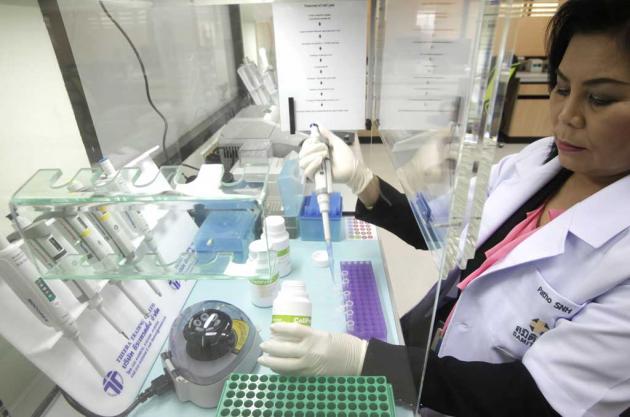Saving lives with a sample

Samitivej Hospital collaborates with the National Cancer Institute and Chualongkorn University's Medical Faculty to develop a urine-based test for HPV
Cervical cancer remains the most common cause of death in Thai women, a fact rendered all the more tragic because it also happens to the easiest to prevent through regular screening and follow-up.
While there several factors that can cause cervical cancer, the human papillomavirus (HPV) is almost always involved and pre-cancers as well as cell changes on the cervix can be easily detected through a pap smear. An HPV test, usually carried out in parallel, checks for the virus that can cause these cell changes. Many women, however, opt not to go from screening, with fear and shyness of having to be in stirrups two of the most commonly cited reasons
Much research over the years has gone into identifying other techniques for testing and more particularly, a non-invasive form of HPV testing through self-collected samples. Such a technique could help to improve coverage of the screened population by encouraging those who refuse to have routine cervical smears to provide samples for testing themselves. The ideal say the doctors, and women would no doubt agree, would be a test similar to the much-used pregnancy kit.
While medical science has yet to come up with such a simple technique, Samitivej Hospital is currently working on an HPV test that’s based on urine.
Because a woman’s cervix and urinary tract are very close to each other and the HPV infection is found in the vulva-vaginal area, the virus can be detected in the urine. Results test for HPV are available in just three days.
Testing in many countries has proved the sensitivity of the assay and well as its efficiency in giving a result close to the conventional test, but here in Thailand, it is still in the research and development stage with Samitivej working in close cooperation with The National Cancer of Institute and Centre of Excellence in Clinical Virology of Chulalongkorn University’s Faculty of Medicine.
To date, more than 1,000 tests have been carried out on Thai women and the first research article will be published soon. If it proves as effective as clinical trials have so far demonstrated, it is likely that Thai FDA approval could be sought as early as next year.
Dr Teerawut Khuhaprema, director of the National Cancer Institute, explains that cervical cancer infection and mortality is often used as an economic index for a country as developing nations have a higher mortality rate because of the lack of an effective screening test.
“That’s why it’s good news for Thailand that our campaign to encourage women to come for screening has led to a steady decline both in new cases and the mortality rates,” he says
HPV has more than 100 genotypes though only some have a high risk of developing into cancer. The 16 and 18 genotypes cause 70 per cent of all cervical cancers while other genotype like 6 and 11 cause genital warts.
The urine-based test can detect 21 genotypes in both the high risk and low risk categories. Women in whom the urine-based test identifies the infection will be followed up with further conventional testing including a pap smear.
It remains, however, less accurate that the conventional cytology test.
Costing around Bt1,000, the urine based test for HPV is best conducted on the urine voided immediately on getting up , as it is at its most concentrated, although study results have shown that even if the urine is collected later in the day, the results are still fairly accurate and reliable if positive but the incidence of false negatives is higher incidence.
The urine-based test has been used as an optional test for more than two years, and is recommended for young people and those who refuse to have the conventional test. Doctors emphasise, however, that the conventional test remains the better of the two.





